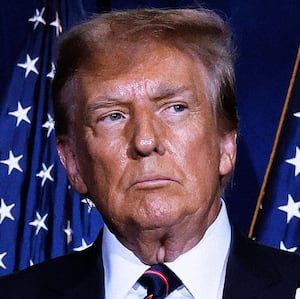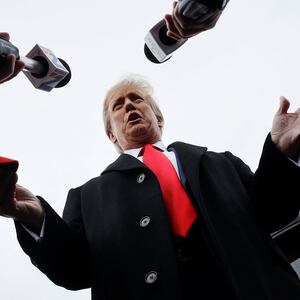Most people don’t think Donald Trump will ever face justice. Certainly his supporters don’t think so—but even among those who want to see a fair process of real accountability for Trump, there is pessimism, bordering on cynicism. Prosecutors are weak, or co-opted, or lack the courage to pursue justice wherever it leads, they say, and so Trump will get away with everything. Prominent, wealthy figures are untouchable and above the law: this is how many people feel right now.
This narrative is wrong. Donald Trump can absolutely be held accountable. I know, because I did it.
While serving at the New York Attorney General’s office, I helped lead the prosecution of Trump University, Trump’s first major legal loss, resulting in a $25 million settlement in 2017 that is still his largest legal payout to date (although it may soon be eclipsed by one or more cases).
Since then, my old colleagues have gone on to victories in the Trump Foundation case in 2019—and now, potentially, in their civil fraud suit against the Trump Organization, which could result in Trump paying up to $370 million to New York State, and losing his New York businesses. Prior to Trump University, he did indeed seem invincible. Today it is a very different story.
How did we do it? How were we able to win when no one else could, and indeed, when many prosecutors didn’t even bother to try?
The playbook for how to defeat Trump is now well-defined—and it’s being followed by many of the prosecutors who are pursuing his various alleged misdeeds.
There are several key elements: courageous leadership, a stoic refusal to be distracted or daunted by Trump’s counterattacks and diversions, dogged and comprehensive investigation, and devotion to savvy communication not only in court filings but with the media and the public.
Courage is the first item on the list for a good reason: it’s the indispensable ingredient, and without it, failure beckons. Any proper prosecution follows the facts and the law, but one must first have the courage to do so, especially when the facts and the law will lead to a high-profile target who will counterattack savagely. If courage is lacking, an elected prosecutor is especially vulnerable to temptation, and Trump has a long history of donations to prosecutors’ campaigns right around the time those prosecutors dropped investigations against Trump.
That courage must continue throughout the whole prosecution, even when Trump begins running his own well-worn playbook—delay, divert, and destroy. He’ll refuse to comply with subpoenas; he’ll create delays with additional motions or appeals; he’ll try to destroy the reputations of the prosecutors, the judges, and even their staff and families. Through it all, brave opponents must stand firm and stick to their arguments and their evidence, avoiding any distractions.
Unshakeable relentlessness is also the order of the day when pursuing evidence. Trump will stonewall, even when faced with court orders and fines, in flagrant dereliction of legal requirements the rest of us have to follow. To overcome this, opponents must fight assertively to force Trump to produce more documents and witnesses—but they must also get creative, subpoenaing Trump’s vendors, especially any former vendors the notoriously cheap and vengeful Trump refused to pay.
Finally, when it’s time for the case to go public, it’s simply not enough to file a normal case and hope for the best. Pursuing a target like Trump requires truly extraordinary efforts to polish a case to perfection—and to remember who else is in the audience in a high-profile case.
The arguments and evidentiary findings must be directed not only to the court but also to the public and the media. Clear communication is critical. There must be a well-structured narrative, with key points that are accessible and obvious. Trump will try to expand the conflict into the public arena, especially when he’s losing in the courtroom, and it’s crucial to occupy that ground before he does.
This playbook may seem simple, but it requires exceptional discipline and dedication to playing the long game, grinding it out, and eventually wearing Trump down—either winning in court, or winning a settlement. And this is the playbook that many of the current prosecutors and litigants are deploying: these cases have seemed slow, but, out of public view, they have accumulated massive amounts of evidence that they are pushing forward, every day, until the momentum is unstoppable.
Trump has mostly avoided accountability for 50 years now, floating above the law. But if the playbook is followed, those days are likely to end soon.
Tristan Snell is the author of the new book Taking Down Trump: 12 Rules for Prosecuting Donald Trump by Someone Who’s Done it Successfully. He is a lawyer and legal commentator on MSNBC and CNN, and he served as Assistant Attorney General for New York State, where he led the investigation and prosecution of Trump University.









